Once more into the past, this time armed with a more comprehensive list of women who debuted in the 1970s¹. In fact, my list has become long enough that I am going have to tackle the authors letter by letter, moving forward. In this case, I am looking at women authors who debuted between 1970 and 1979 and whose surnames begin with G.
Sally Miller Gearhart
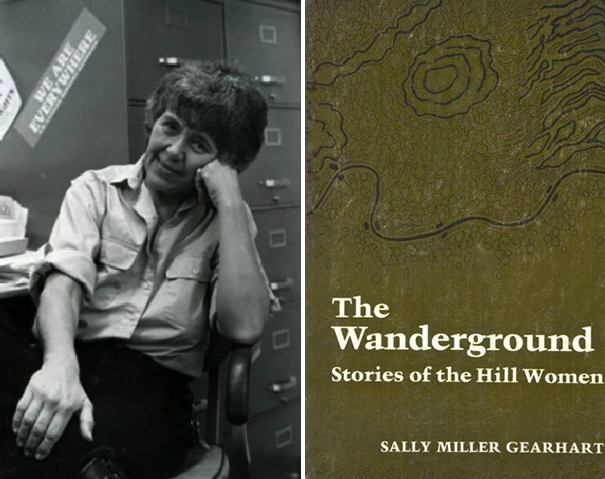
Gearhart may be best known now for her political activism and her decades of scholarly work. The Sally Miller Gearhart Chair in Lesbian Studies at the University of Oregon is named for her. SF fans unacquainted with her work might do well start with The Wanderground, a novel about feminist separatism set in a near future. Any of you planning to write a feminist separatist novel (or found a separatist feminist community) might want to explore prior art, including Gearhart’s contributions.
Mary Gentle
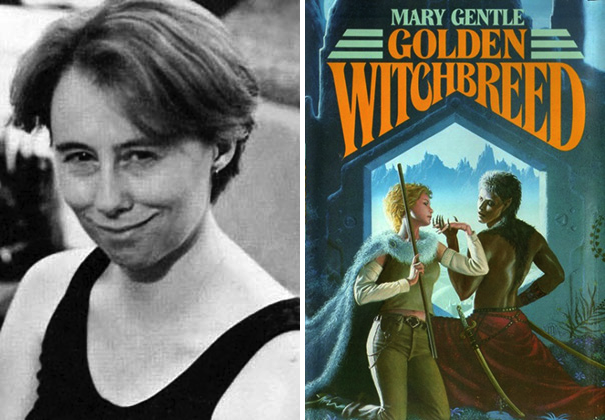
The least-aptly surnamed author in speculative fiction, Gentle is prolific, talented, and in no sense gentle. The best starting point for Gentle is her 1983 two-cultures-in-contact story, Golden Witchbreed, the first in the Orthe series. Caveat: you might want to be wary of the sequel, which expands on the setting in ways that many fans of Golden Witchbreed have disliked and loudly protested.
Dian Girard
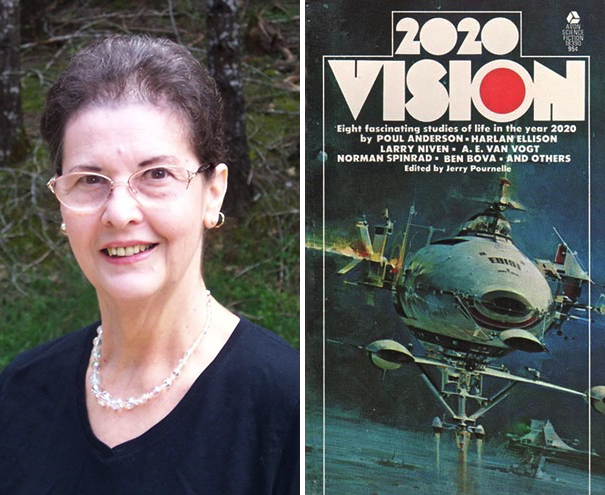
Under her maiden name Girard, Dian published a number of short pieces in venues like Amazing, Galaxy, and Jerry Pournelle’s 2020 Vision². As J. D. Crayne, she made a lateral move into mystery—yet another loss for SFF and gain for the mystery genre. (The mystery audience is ten times the size of SF’s; mystery writers can often indulge in such luxuries as food, clothing, and shelter.) Her story “Eat, Drink, and Be Merry,” which sets one determined woman against a society determined to monitor her diet for her, would be an excellent starting point for Girard… if it had not been out of print for more than four decades.
Lisa Goldstein
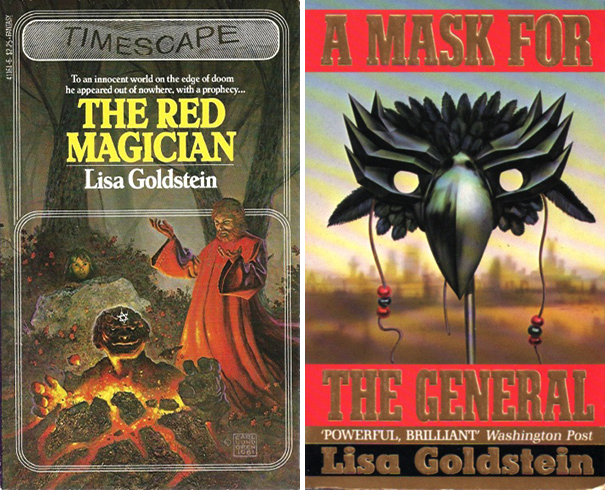
A better-read reviewer than I would almost certainly recommend reading Lisa Goldstein’s award-winning The Red Magician. However, I have not yet gotten around to it; the book has been living in my Everest-emulating Mount Tsundoku since it came out in 1983. I can, however, recommend A Mask for the General, which relates an artist’s unconventional struggle against the brutal autocrat who has ruled America ever since an economic crisis undermined American faith in democratic institutions³.
Jeanne Gomoll
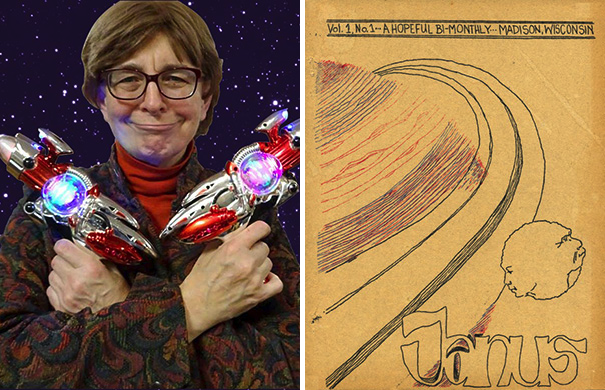
Editor, artist, and essayist Gomoll’s body of science fiction is comparatively small; I don’t think I’ve read any of it. No worries, because the Gomoll I would recommend is her non-fiction (but SF-related) essay “An Open Letter to Joanna Russ,” available online here. In it she discusses yet another example of the sort of historical erasure I am hoping to, in turn, erase.
Eileen Gunn
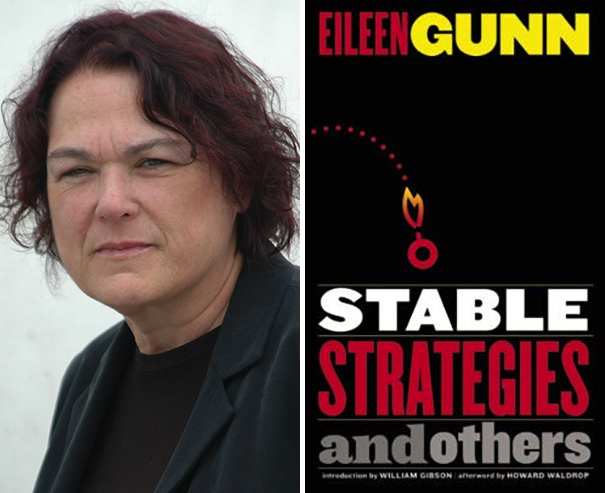
Gunn’s fiction has thus far been of the short variety; the trick with such authors in this collection-and anthology unfriendly world—curse you, Roger Elwood!— can be to find something still in print. Happily with Gunn, this is no problem. Her 2004 collection Stable Strategies and Others contains (among other works) the 1989 Hugo Award Finalist “Stable Strategies for Middle Management,” the 1990 Hugo Award Finalist “Computer Friendly,” the 2004 Nebula Award winner “Coming to Terms,” and the 2006 Nebula Award Nominee and James Tiptree Jr. Award Shortlisted novelette (co-written with Leslie What) “Nirvana High.”
***
The best part of having greatly expanded my list of women who debuted in the 1970s is that I can now appreciate just how much I do not know, Learning new things gives me an endorphin rush, so I look forward to new and better drug highs. Please help. I am unfamiliar with the following authors and would invite useful commentary:
- Joan Garrison
- Roberta Gellis
- Anna Louise Germeshausen
- Catherine Gleason
- Margaret Greaves
- Joyce Ballou Gregorian
1: Nota bene: this series only covers women whose published careers began between 1970 and 1979. If their career began before 1970 or after 1979, then they fall outside my target range.
2: Which I will review on my own site Sunday, Jan 5th, 2020, probably about 3:30 AM. Kitchener time. Because stuff and things.
3: A Mask for the General is inextricably entangled in my mind with Pat Murphy’s The City, Not Long After, which also pits artists against autocrats.
In the words of Wikipedia editor TexasAndroid, prolific book reviewer and perennial Darwin Award nominee James Davis Nicoll is of “questionable notability.” His work has appeared in Publishers Weekly and Romantic Times as well as on his own websites, James Nicoll Reviews and Young People Read Old SFF (where he is assisted by editor Karen Lofstrom and web person Adrienne L. Travis). He is surprisingly flammable.










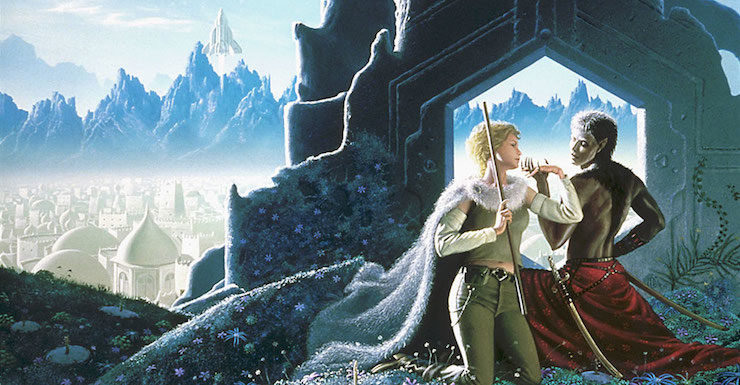
A note on Gunn, she has a story in Visions, Ventures, Escape Velocities, a free ebook combining near future short stories by various SF authors and essays by space scientists on various issues about near future space exploration. So if you want a free sample of her recent work, it might be worth checking out.
And I thought I was terrible for keeping books for long periods of time without reading them.
1: Thank you!
2: I’ve been assembling Mt. Tsundoku since at least the 1970s.
Roberta Gellis was primarily a historical romance writer (these are where I know her work) – she has one romance series based on Greek mythology. But she teamed up with Mercedes Lackey for the Doubled Edge series – a secret-history with fairies in Tudor England – which is a prequel to Lackey’s SERRAted Edge where the fairies are having adventures in modern day (the 90s). Mercedes Lackey did/does a lot of partnered writing.
She also has one space opera, Overstalls Mail which looks awesome and now I have to track it down.
And according to Wikipedia, she also wrote two other scifi books under the name Max Daniels, in 1978 and 1979, both of which have great cheesy covers – Offworld and The Space Guardian – and sound like fun adventures.
Reinforcing serralinda’s background on Roberta Gellis, her SFF career started in the 1970s but she had several historical novels published in the 1960s.In addition to the historical romance and fantasy, she has written historical mysteries and I think some non-romantic non-mystery historicals as well. Truly a versatile writer!
Thanks for the mention! The Red Magician, my first book, actually came out in 1982, but I guess I can be squeezed into the 1970s because I had a story in an anthology called Pandora in 1979.
This is a very helpful series of posts.
I will read Red Magician some day!
Actually, I meant to read this ages ago could be a series of reviews. I even have a list handy:
Twenty Core Speculative Fiction Works It May Surprise You To Learn I Have Not Yet Read Every True SF Fan Should Have On Their Shelves
Gentle is definitely a misnomer. Many years ago I ran a Doctor Who RPG at an SF con, with Mary taking the role of Leela and trying to prevent the extinction of humanity by preventing a noted film actor from becoming US President.
Mary: “I am Leela, Warrior of the Sevateen!”
John Wayne: “Well hello there, little lady.”
Mary: “Can I kill him now, Doctor?”
I was knocked sideways by Mary Gentle’s Rats and Gargoyles and Ash. For whatever reason I haven’t got around to reading her later works. Should I?
@9 You must read Grunts! at least, wickedly fun parody with the Dark Lord’s army looting a dragon’s hoard and being cursed to become US Marines. Except for the one who becomes Che Guevara. Very black humour.
Joyce Ballou Gregorian wrote a portal fantasy trilogy, comprised of “The Broken Citadel”, “Castledown”, and “The Great Wheel”. I’ve never found any other works, but haven’t done any deep research either. Amazon reports dates of 1975, 1977, and 1991 for the books, and I remember finding the last one by accident.
I would add Ansen Dibell to this list. She’s a compartively obscure author of Science Fantasy and media tie-in (under her name Nan Dibble). However, for me she was one of the most formative writers I read. Her series, The High King of Kantmorie, dealt with some truly fascinating aspects of consciousness* and cross-cultural/species interaction. Her first novel, The Pursuit of the Screamer (ignore the lurid cover), came out in 1978, followed by Circle, Crescent, Star and Summerfair.
DAW didn’t print the final two books in the series (Tidestorm Limit and The Sun of the Return), but fans can hunt them down in French or Dutch.
Anyhow, I always drop in and sing her praise when I get the chance…so here I am.
*the rede-cap and the meat are very much the same as Altered Carbon‘s stack and sheath.
The problem with adding Dibell to this list in particular is this is the list for women who debuted in the 1970s whose names begin with G and Dibell is traditionally spelled with a D. She did come up in the A – F entry, though.
Sorry…I missed that line up top. ::headdesk::
I would recommend “The Broken Citadel” and “Castledown” by Joyce Ballou Gregorian . Some portal fantasy tropes, with prophesized Mary Sue appearing to save wherever from the big bad. Yet the heroine’s journey featured some… peculiar detours. The epic victories kept getting undermined by the everyday defeats. A remarkable number characters using and discarding others.
I really should track down the third book.
@9: IIRC 1610 (2003, a little post-Ash) in the same space as Rats and Gargoyles; very worthwhile. I haven’t kept up with her later work; another few titles for Mt. Tsundoku!
@2: I’ve taken to marking the acquisition date on the first leaf of the book, so I can say “read this or toss it!” — if I ever do a clean sweep of my 35-40 feet of unread books.
14, it’s ok, there’s been a few instances of others injecting suggestions and not even coming close to the mark.
16, linear, square, or cubic?
I really, really need to work on making the date range and the alphabetical nature of my approach clearer. Preferably without going all George Bernard Shaw…
How can you be clearer than that? People interested in books should be able to read.
Pauline Gedge started publishing historical novels in the seventies. Her notable sf novel, Stargate, came out in 1982. It has nothing to do with the tv show.
I keep buying Stargate and then misplacing my copy….
Roberta Gellis wrote a large number of historical romances which were very heavy on the history and accurate about it. They’re not your typical bodice ripper. Her Max Daniels sf is fun (and not really romantic) and I recall the heroine being very smart and independent at a time when that was a rarity. Her newer work though is kind of weak.
Serralinda,
I believe the Gellis book on “Mail” has a slightly different title, perhaps Overstars Mail. I have at least a couple of these, perhaps this and one of the Max Daniels.
Drat you! Made me climb into the attic to search the boxes of ‘overflow’ books for Joyce Ballou Gregorian’s Tredana trilogy. And aHA! I still have all three!
I remember loving these, but they were likely in the overflow because I out grew them – still they made the cut to go all the way across the country and then back again when I moved.
@19,
It’s not that we they can’t read; it’s that we they won’t follow directions.
Joyce Ballou Gregorian wrote a trilogy, published by ACE Fantasy in the 80s I think. The titles (in order) were “The Broken Citadel”, “Castledown” and “The Great Wheel.” I still have my old beat up paperbacks. They are long out of print and sort of hard to find. Definitely worth reading, ‘though.
You might also consider HM Hoover. Her stuff would be classified as YA today, but it is mostly excellent and generally feminist work. I particularly recommend:
The Rains of Eridan
The Delikon
The Lost Star
This Time of Darkness
Return to Earth
Traditionally, Hoover is spelled with an H and not a G, so would fall outside the purview of a piece devoted specifically to women authors of the 1970s whose surnames begin with G.
Mary Gentle’s sequel to Golden Witchbreed is awesome, though shattering. I think it is better than the first of the series. I won’t desctibe it further, or I will fall into spoilers. But read it! And, perhaps, weep.
Been a while since I read the Gregorian trilogy – but they’re there on my bookshelves, having been through 2 house moves. The first move wasn’t too traumatic – I moved out of my Mum’s house, and lived in bedsits for a few years, and the bulk if my library lived in boxes in Mum’s spare room. After that, I rented a house with enough space for several bookcases in the room under the stairs – which turned into a walk-in library. At that point, my Mum said (rather plaintively) ‘now you’ve got your own house darling, can I have my spare room back?’ (not quite sure why – by that point she wasn’t on speaking terms with any of the relatives or they were dead).
I’m currently reading Mary Gentle – I’ve nearly finished Rats & Gargoyles, and recently finished Grunts!, Cartomancy and the Orthe duology, having got them in the Christmas Gateway SF sale. I will say that she certainly doesn’t sanitise everyday life like much modern fantasy does.
My favourite Gellis is a mystery – Lucrezia Borgia and the Mother of Poisons. I’m not too fond of the Mythology series – they stray too much into romance territory for my tastes, and I haven’t bothered with the rest of the historicals/mysteries as yet. I have the Lackey collaboration, that was one of the set to get culled in the most recent house move, mostly because I had them as electronic versions of the Baen CD-ROMs. I prefer my urban fantasy to be modern rather than historical (although I made an exception for Ash).
Besides Ash, of course, I really enjoyed Mary Gentle’s Rat Lord series. Rats and Gargoyles was the first book of hers that I read. Novella Under the Penitence (PS Pub chapbook) has probably not been read by many people, but it’s great and well worth seeing out.
Lisa Goldstein is wonderful. I started reading her work with her first novel The Red Magician when that came out from Timescape in 1982 and have read everything she’s published since except for her most recent, Weighing Shadows, which I haven’t gotten to yet. Soon.
Thank you for this series about women sf/f writers of the 1970s, and particularly for the link to the essay by Gomoll! I am currently studying women SF writers who wrote works prior to 1980, and this is very helpful.